Organisational Behaviour Report: Tesco, Culture, and Performance
VerifiedAdded on 2021/02/19
|19
|4765
|43
Report
AI Summary
This report offers a comprehensive analysis of organisational behaviour, using Tesco as a case study. It explores the impact of organisational culture, politics, and power on team and individual performance, referencing Handy's culture typology and Hofstede's cultural dimensions model. The report delves into various motivational theories, including Herzberg's Two-Factor Theory, and examines the characteristics of effective and ineffective teams. It also discusses the philosophies and concepts underpinning organisational behaviour, providing insights into how these elements influence employee performance, organisational effectiveness, and overall business outcomes. The analysis highlights the importance of a positive organisational culture, effective leadership, and strategic management to achieve organisational goals and objectives.
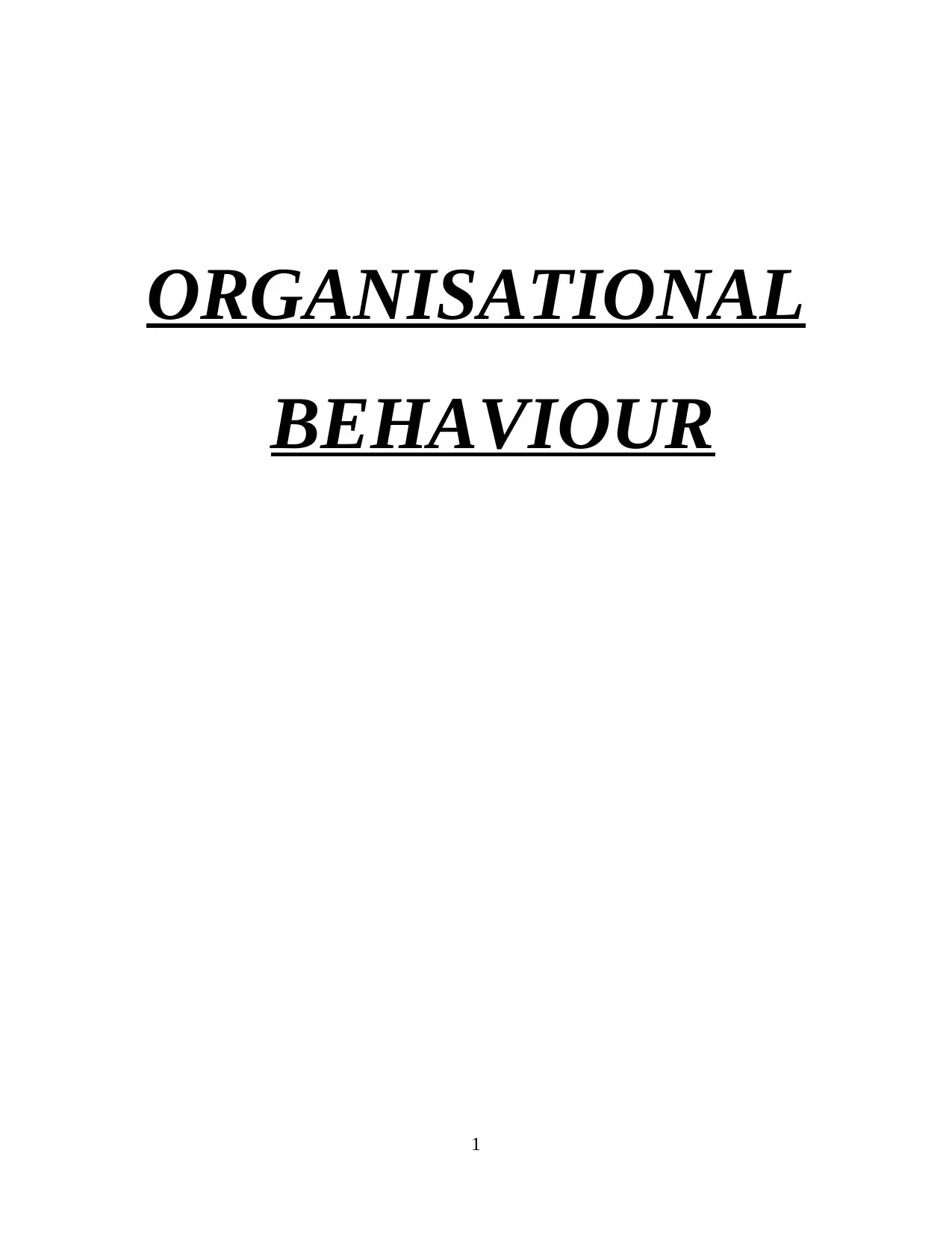
ORGANISATIONAL
BEHAVIOUR
1
BEHAVIOUR
1
Paraphrase This Document
Need a fresh take? Get an instant paraphrase of this document with our AI Paraphraser
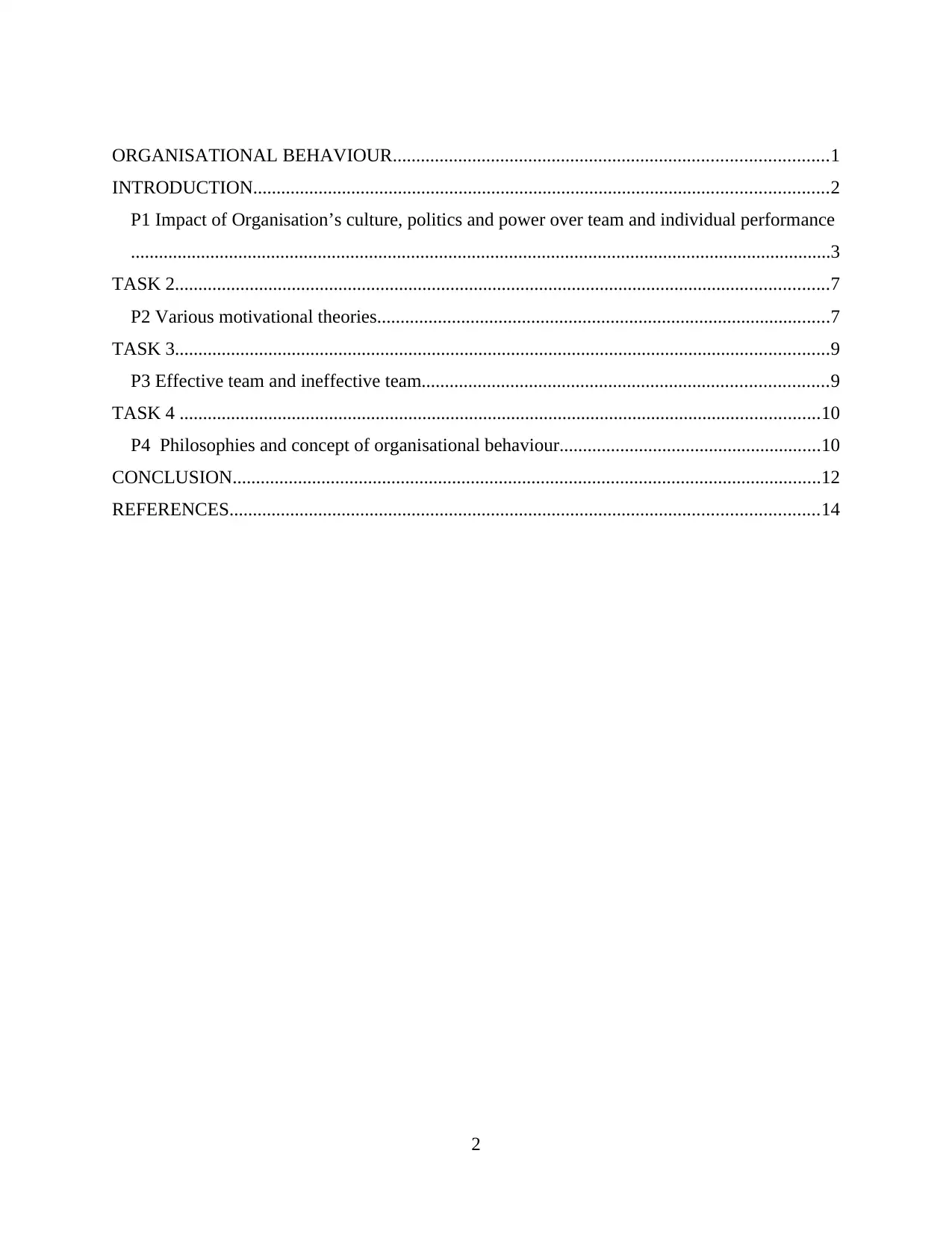
ORGANISATIONAL BEHAVIOUR.............................................................................................1
INTRODUCTION...........................................................................................................................2
P1 Impact of Organisation’s culture, politics and power over team and individual performance
......................................................................................................................................................3
TASK 2............................................................................................................................................7
P2 Various motivational theories.................................................................................................7
TASK 3............................................................................................................................................9
P3 Effective team and ineffective team.......................................................................................9
TASK 4 .........................................................................................................................................10
P4 Philosophies and concept of organisational behaviour........................................................10
CONCLUSION..............................................................................................................................12
REFERENCES..............................................................................................................................14
2
INTRODUCTION...........................................................................................................................2
P1 Impact of Organisation’s culture, politics and power over team and individual performance
......................................................................................................................................................3
TASK 2............................................................................................................................................7
P2 Various motivational theories.................................................................................................7
TASK 3............................................................................................................................................9
P3 Effective team and ineffective team.......................................................................................9
TASK 4 .........................................................................................................................................10
P4 Philosophies and concept of organisational behaviour........................................................10
CONCLUSION..............................................................................................................................12
REFERENCES..............................................................................................................................14
2
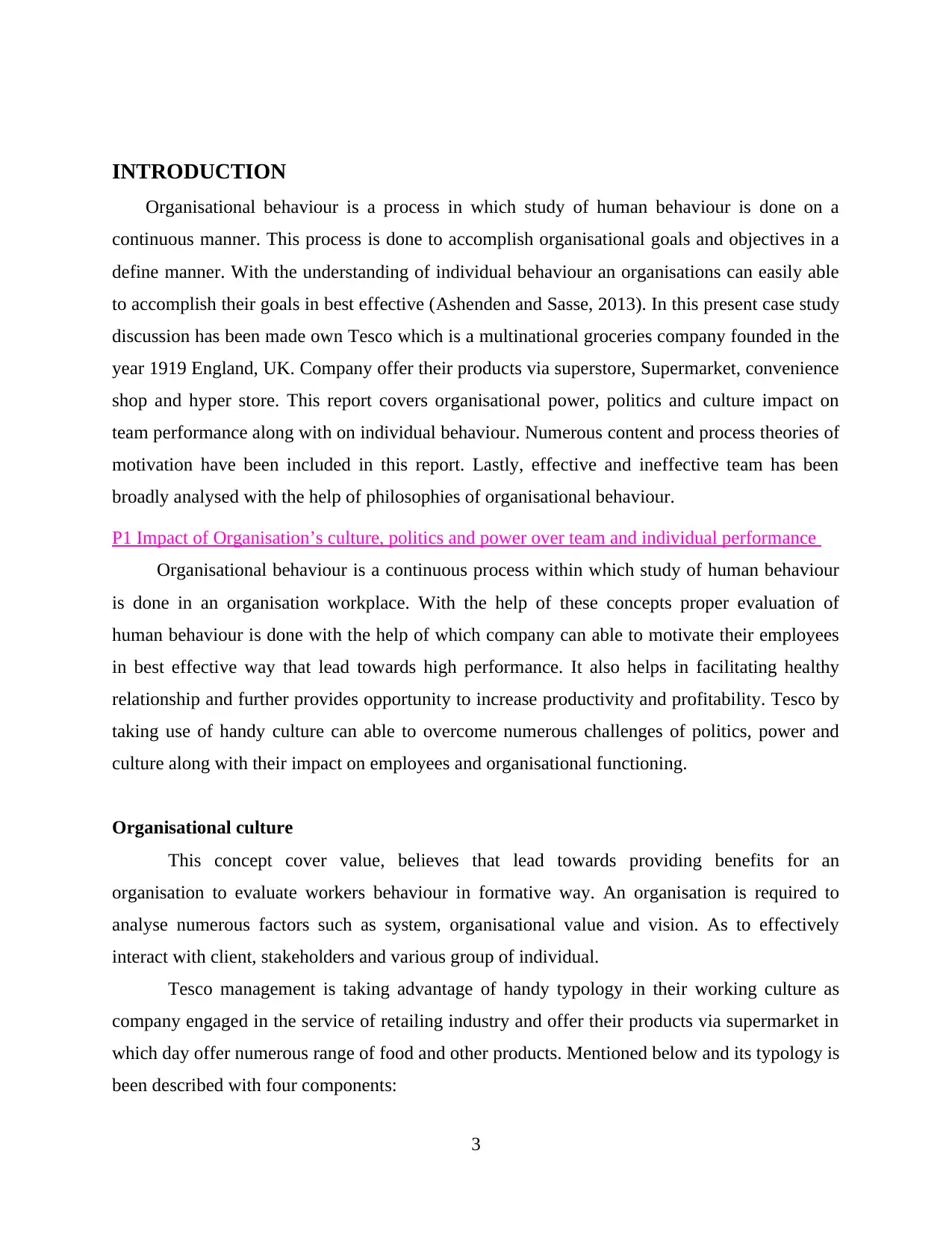
INTRODUCTION
Organisational behaviour is a process in which study of human behaviour is done on a
continuous manner. This process is done to accomplish organisational goals and objectives in a
define manner. With the understanding of individual behaviour an organisations can easily able
to accomplish their goals in best effective (Ashenden and Sasse, 2013). In this present case study
discussion has been made own Tesco which is a multinational groceries company founded in the
year 1919 England, UK. Company offer their products via superstore, Supermarket, convenience
shop and hyper store. This report covers organisational power, politics and culture impact on
team performance along with on individual behaviour. Numerous content and process theories of
motivation have been included in this report. Lastly, effective and ineffective team has been
broadly analysed with the help of philosophies of organisational behaviour.
P1 Impact of Organisation’s culture, politics and power over team and individual performance
Organisational behaviour is a continuous process within which study of human behaviour
is done in an organisation workplace. With the help of these concepts proper evaluation of
human behaviour is done with the help of which company can able to motivate their employees
in best effective way that lead towards high performance. It also helps in facilitating healthy
relationship and further provides opportunity to increase productivity and profitability. Tesco by
taking use of handy culture can able to overcome numerous challenges of politics, power and
culture along with their impact on employees and organisational functioning.
Organisational culture
This concept cover value, believes that lead towards providing benefits for an
organisation to evaluate workers behaviour in formative way. An organisation is required to
analyse numerous factors such as system, organisational value and vision. As to effectively
interact with client, stakeholders and various group of individual.
Tesco management is taking advantage of handy typology in their working culture as
company engaged in the service of retailing industry and offer their products via supermarket in
which day offer numerous range of food and other products. Mentioned below and its typology is
been described with four components:
3
Organisational behaviour is a process in which study of human behaviour is done on a
continuous manner. This process is done to accomplish organisational goals and objectives in a
define manner. With the understanding of individual behaviour an organisations can easily able
to accomplish their goals in best effective (Ashenden and Sasse, 2013). In this present case study
discussion has been made own Tesco which is a multinational groceries company founded in the
year 1919 England, UK. Company offer their products via superstore, Supermarket, convenience
shop and hyper store. This report covers organisational power, politics and culture impact on
team performance along with on individual behaviour. Numerous content and process theories of
motivation have been included in this report. Lastly, effective and ineffective team has been
broadly analysed with the help of philosophies of organisational behaviour.
P1 Impact of Organisation’s culture, politics and power over team and individual performance
Organisational behaviour is a continuous process within which study of human behaviour
is done in an organisation workplace. With the help of these concepts proper evaluation of
human behaviour is done with the help of which company can able to motivate their employees
in best effective way that lead towards high performance. It also helps in facilitating healthy
relationship and further provides opportunity to increase productivity and profitability. Tesco by
taking use of handy culture can able to overcome numerous challenges of politics, power and
culture along with their impact on employees and organisational functioning.
Organisational culture
This concept cover value, believes that lead towards providing benefits for an
organisation to evaluate workers behaviour in formative way. An organisation is required to
analyse numerous factors such as system, organisational value and vision. As to effectively
interact with client, stakeholders and various group of individual.
Tesco management is taking advantage of handy typology in their working culture as
company engaged in the service of retailing industry and offer their products via supermarket in
which day offer numerous range of food and other products. Mentioned below and its typology is
been described with four components:
3
⊘ This is a preview!⊘
Do you want full access?
Subscribe today to unlock all pages.

Trusted by 1+ million students worldwide
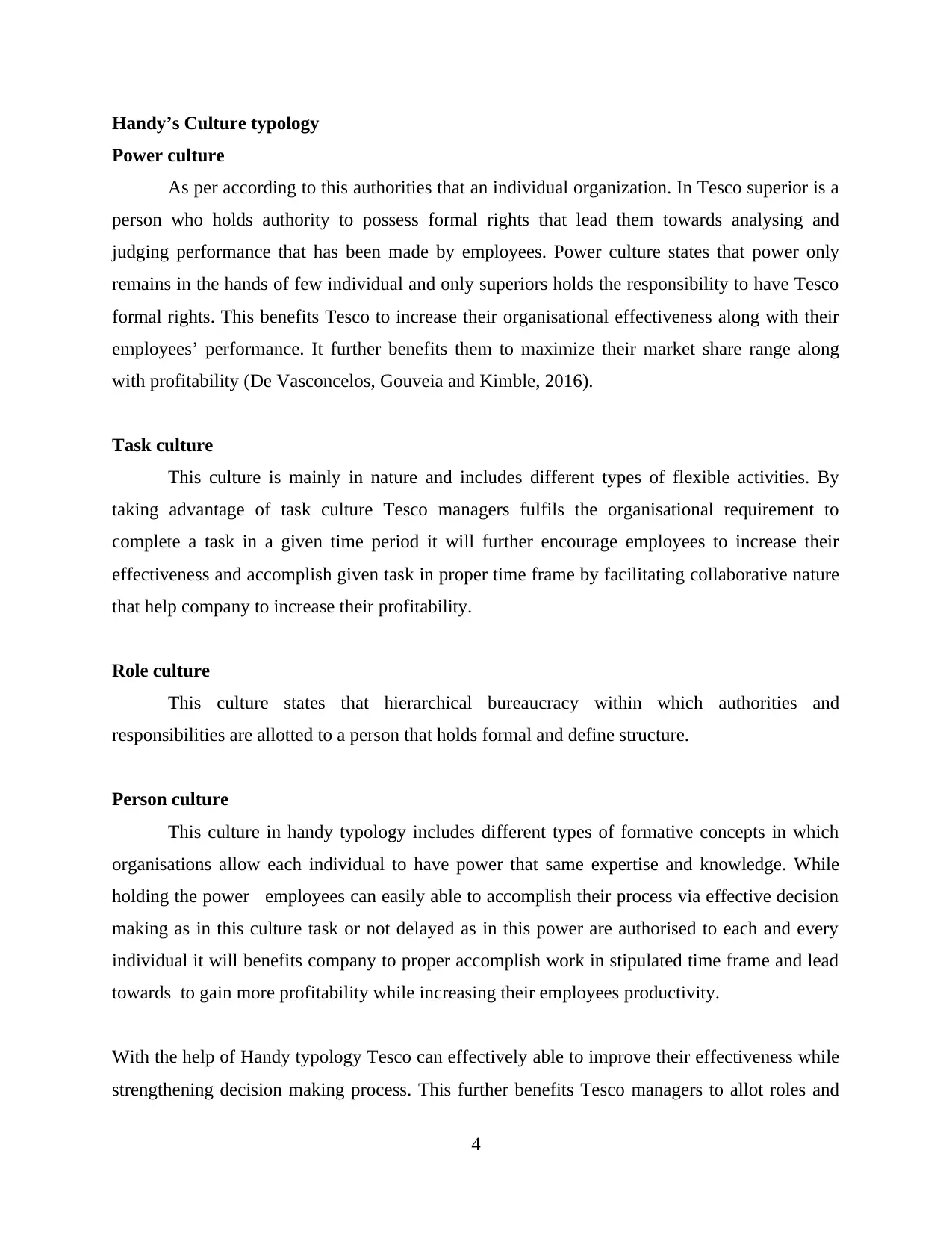
Handy’s Culture typology
Power culture
As per according to this authorities that an individual organization. In Tesco superior is a
person who holds authority to possess formal rights that lead them towards analysing and
judging performance that has been made by employees. Power culture states that power only
remains in the hands of few individual and only superiors holds the responsibility to have Tesco
formal rights. This benefits Tesco to increase their organisational effectiveness along with their
employees’ performance. It further benefits them to maximize their market share range along
with profitability (De Vasconcelos, Gouveia and Kimble, 2016).
Task culture
This culture is mainly in nature and includes different types of flexible activities. By
taking advantage of task culture Tesco managers fulfils the organisational requirement to
complete a task in a given time period it will further encourage employees to increase their
effectiveness and accomplish given task in proper time frame by facilitating collaborative nature
that help company to increase their profitability.
Role culture
This culture states that hierarchical bureaucracy within which authorities and
responsibilities are allotted to a person that holds formal and define structure.
Person culture
This culture in handy typology includes different types of formative concepts in which
organisations allow each individual to have power that same expertise and knowledge. While
holding the power employees can easily able to accomplish their process via effective decision
making as in this culture task or not delayed as in this power are authorised to each and every
individual it will benefits company to proper accomplish work in stipulated time frame and lead
towards to gain more profitability while increasing their employees productivity.
With the help of Handy typology Tesco can effectively able to improve their effectiveness while
strengthening decision making process. This further benefits Tesco managers to allot roles and
4
Power culture
As per according to this authorities that an individual organization. In Tesco superior is a
person who holds authority to possess formal rights that lead them towards analysing and
judging performance that has been made by employees. Power culture states that power only
remains in the hands of few individual and only superiors holds the responsibility to have Tesco
formal rights. This benefits Tesco to increase their organisational effectiveness along with their
employees’ performance. It further benefits them to maximize their market share range along
with profitability (De Vasconcelos, Gouveia and Kimble, 2016).
Task culture
This culture is mainly in nature and includes different types of flexible activities. By
taking advantage of task culture Tesco managers fulfils the organisational requirement to
complete a task in a given time period it will further encourage employees to increase their
effectiveness and accomplish given task in proper time frame by facilitating collaborative nature
that help company to increase their profitability.
Role culture
This culture states that hierarchical bureaucracy within which authorities and
responsibilities are allotted to a person that holds formal and define structure.
Person culture
This culture in handy typology includes different types of formative concepts in which
organisations allow each individual to have power that same expertise and knowledge. While
holding the power employees can easily able to accomplish their process via effective decision
making as in this culture task or not delayed as in this power are authorised to each and every
individual it will benefits company to proper accomplish work in stipulated time frame and lead
towards to gain more profitability while increasing their employees productivity.
With the help of Handy typology Tesco can effectively able to improve their effectiveness while
strengthening decision making process. This further benefits Tesco managers to allot roles and
4
Paraphrase This Document
Need a fresh take? Get an instant paraphrase of this document with our AI Paraphraser
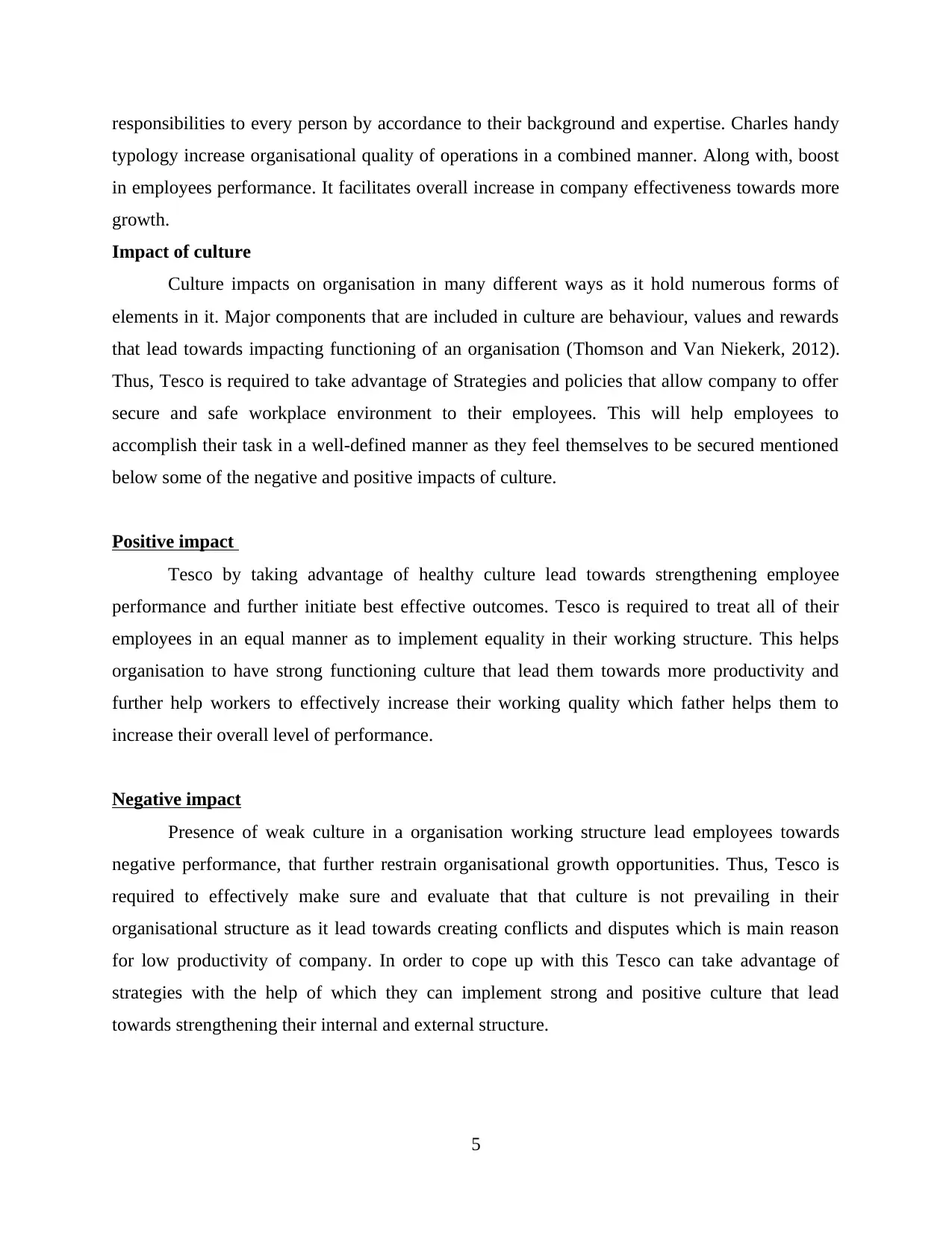
responsibilities to every person by accordance to their background and expertise. Charles handy
typology increase organisational quality of operations in a combined manner. Along with, boost
in employees performance. It facilitates overall increase in company effectiveness towards more
growth.
Impact of culture
Culture impacts on organisation in many different ways as it hold numerous forms of
elements in it. Major components that are included in culture are behaviour, values and rewards
that lead towards impacting functioning of an organisation (Thomson and Van Niekerk, 2012).
Thus, Tesco is required to take advantage of Strategies and policies that allow company to offer
secure and safe workplace environment to their employees. This will help employees to
accomplish their task in a well-defined manner as they feel themselves to be secured mentioned
below some of the negative and positive impacts of culture.
Positive impact
Tesco by taking advantage of healthy culture lead towards strengthening employee
performance and further initiate best effective outcomes. Tesco is required to treat all of their
employees in an equal manner as to implement equality in their working structure. This helps
organisation to have strong functioning culture that lead them towards more productivity and
further help workers to effectively increase their working quality which father helps them to
increase their overall level of performance.
Negative impact
Presence of weak culture in a organisation working structure lead employees towards
negative performance, that further restrain organisational growth opportunities. Thus, Tesco is
required to effectively make sure and evaluate that that culture is not prevailing in their
organisational structure as it lead towards creating conflicts and disputes which is main reason
for low productivity of company. In order to cope up with this Tesco can take advantage of
strategies with the help of which they can implement strong and positive culture that lead
towards strengthening their internal and external structure.
5
typology increase organisational quality of operations in a combined manner. Along with, boost
in employees performance. It facilitates overall increase in company effectiveness towards more
growth.
Impact of culture
Culture impacts on organisation in many different ways as it hold numerous forms of
elements in it. Major components that are included in culture are behaviour, values and rewards
that lead towards impacting functioning of an organisation (Thomson and Van Niekerk, 2012).
Thus, Tesco is required to take advantage of Strategies and policies that allow company to offer
secure and safe workplace environment to their employees. This will help employees to
accomplish their task in a well-defined manner as they feel themselves to be secured mentioned
below some of the negative and positive impacts of culture.
Positive impact
Tesco by taking advantage of healthy culture lead towards strengthening employee
performance and further initiate best effective outcomes. Tesco is required to treat all of their
employees in an equal manner as to implement equality in their working structure. This helps
organisation to have strong functioning culture that lead them towards more productivity and
further help workers to effectively increase their working quality which father helps them to
increase their overall level of performance.
Negative impact
Presence of weak culture in a organisation working structure lead employees towards
negative performance, that further restrain organisational growth opportunities. Thus, Tesco is
required to effectively make sure and evaluate that that culture is not prevailing in their
organisational structure as it lead towards creating conflicts and disputes which is main reason
for low productivity of company. In order to cope up with this Tesco can take advantage of
strategies with the help of which they can implement strong and positive culture that lead
towards strengthening their internal and external structure.
5
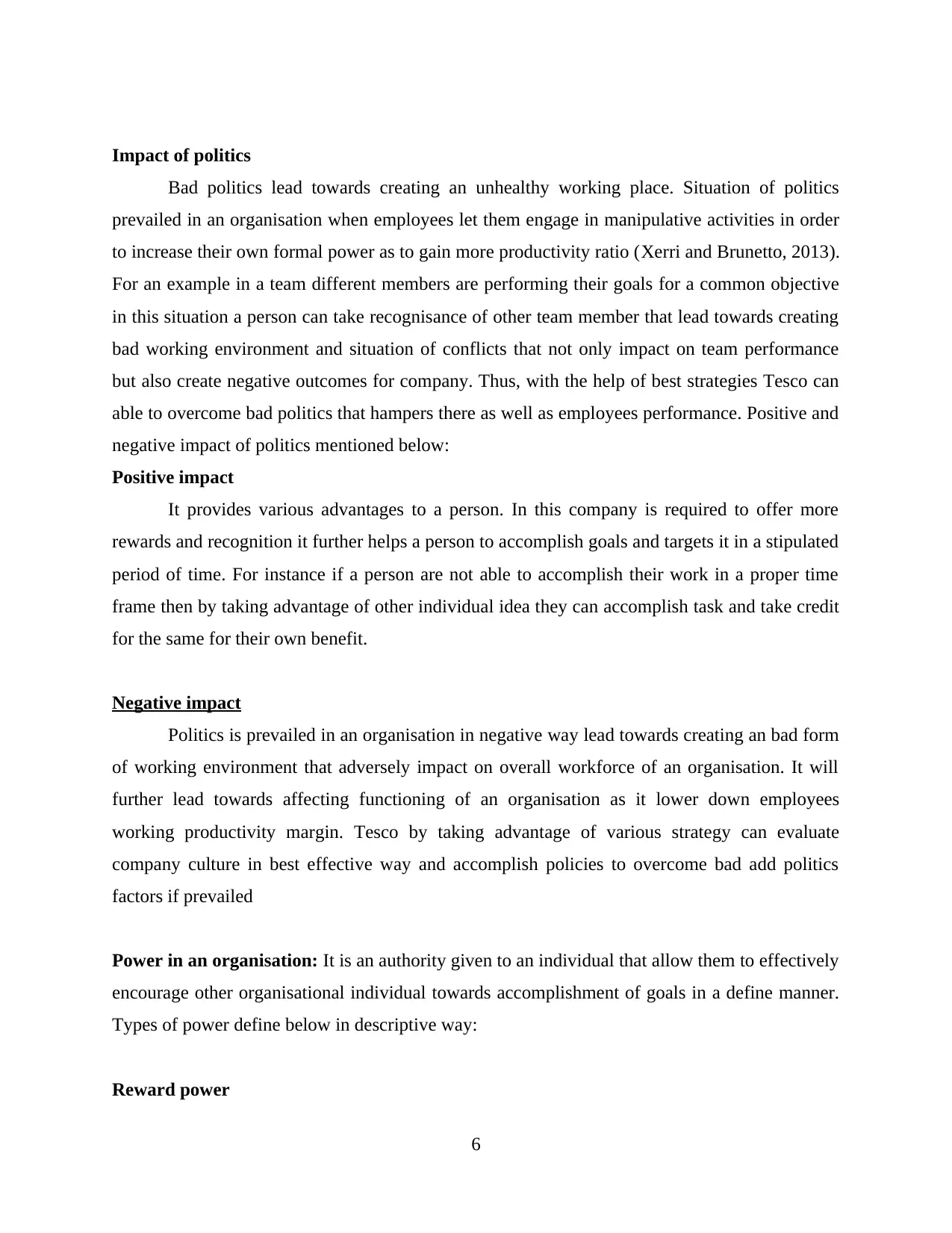
Impact of politics
Bad politics lead towards creating an unhealthy working place. Situation of politics
prevailed in an organisation when employees let them engage in manipulative activities in order
to increase their own formal power as to gain more productivity ratio (Xerri and Brunetto, 2013).
For an example in a team different members are performing their goals for a common objective
in this situation a person can take recognisance of other team member that lead towards creating
bad working environment and situation of conflicts that not only impact on team performance
but also create negative outcomes for company. Thus, with the help of best strategies Tesco can
able to overcome bad politics that hampers there as well as employees performance. Positive and
negative impact of politics mentioned below:
Positive impact
It provides various advantages to a person. In this company is required to offer more
rewards and recognition it further helps a person to accomplish goals and targets it in a stipulated
period of time. For instance if a person are not able to accomplish their work in a proper time
frame then by taking advantage of other individual idea they can accomplish task and take credit
for the same for their own benefit.
Negative impact
Politics is prevailed in an organisation in negative way lead towards creating an bad form
of working environment that adversely impact on overall workforce of an organisation. It will
further lead towards affecting functioning of an organisation as it lower down employees
working productivity margin. Tesco by taking advantage of various strategy can evaluate
company culture in best effective way and accomplish policies to overcome bad add politics
factors if prevailed
Power in an organisation: It is an authority given to an individual that allow them to effectively
encourage other organisational individual towards accomplishment of goals in a define manner.
Types of power define below in descriptive way:
Reward power
6
Bad politics lead towards creating an unhealthy working place. Situation of politics
prevailed in an organisation when employees let them engage in manipulative activities in order
to increase their own formal power as to gain more productivity ratio (Xerri and Brunetto, 2013).
For an example in a team different members are performing their goals for a common objective
in this situation a person can take recognisance of other team member that lead towards creating
bad working environment and situation of conflicts that not only impact on team performance
but also create negative outcomes for company. Thus, with the help of best strategies Tesco can
able to overcome bad politics that hampers there as well as employees performance. Positive and
negative impact of politics mentioned below:
Positive impact
It provides various advantages to a person. In this company is required to offer more
rewards and recognition it further helps a person to accomplish goals and targets it in a stipulated
period of time. For instance if a person are not able to accomplish their work in a proper time
frame then by taking advantage of other individual idea they can accomplish task and take credit
for the same for their own benefit.
Negative impact
Politics is prevailed in an organisation in negative way lead towards creating an bad form
of working environment that adversely impact on overall workforce of an organisation. It will
further lead towards affecting functioning of an organisation as it lower down employees
working productivity margin. Tesco by taking advantage of various strategy can evaluate
company culture in best effective way and accomplish policies to overcome bad add politics
factors if prevailed
Power in an organisation: It is an authority given to an individual that allow them to effectively
encourage other organisational individual towards accomplishment of goals in a define manner.
Types of power define below in descriptive way:
Reward power
6
⊘ This is a preview!⊘
Do you want full access?
Subscribe today to unlock all pages.

Trusted by 1+ million students worldwide
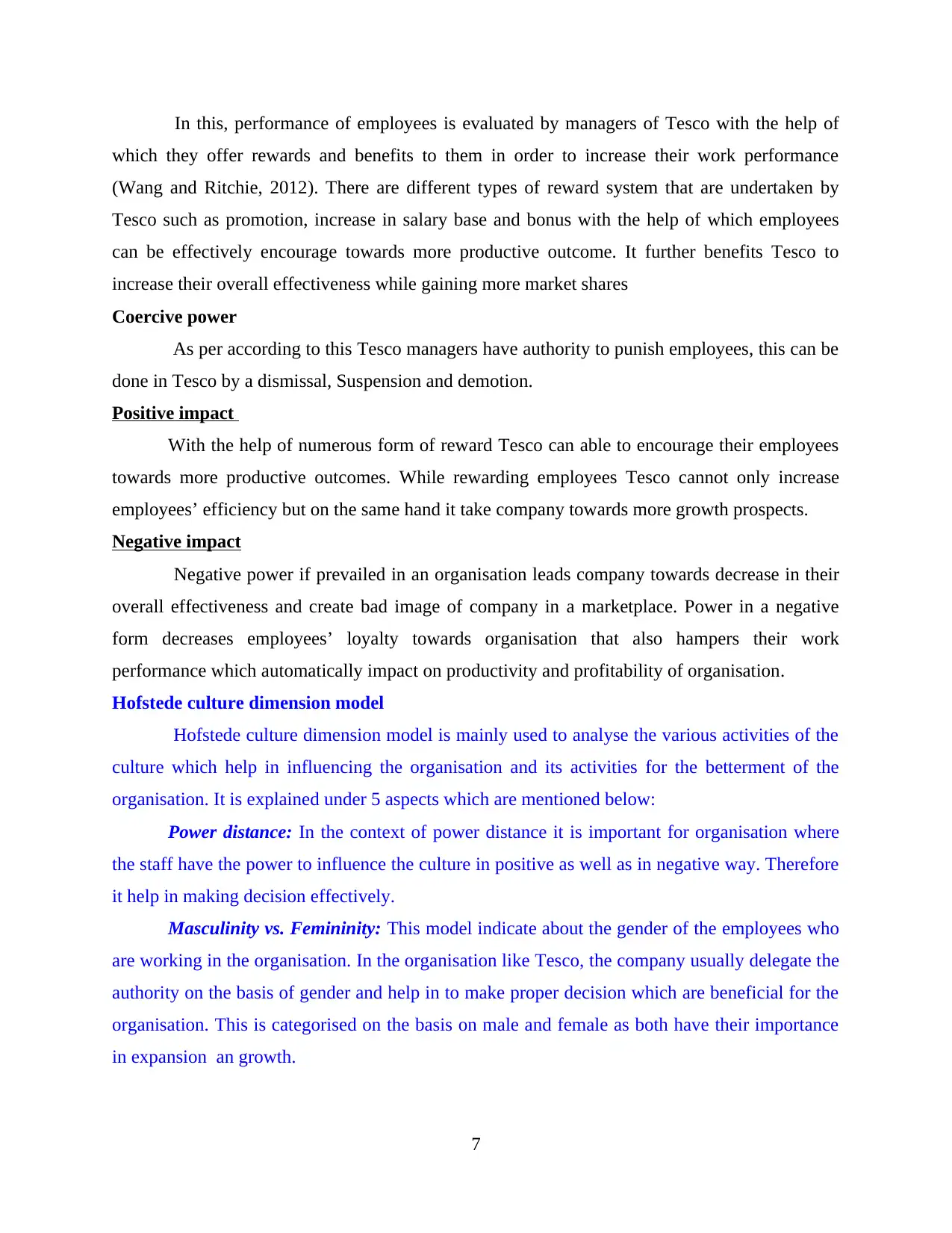
In this, performance of employees is evaluated by managers of Tesco with the help of
which they offer rewards and benefits to them in order to increase their work performance
(Wang and Ritchie, 2012). There are different types of reward system that are undertaken by
Tesco such as promotion, increase in salary base and bonus with the help of which employees
can be effectively encourage towards more productive outcome. It further benefits Tesco to
increase their overall effectiveness while gaining more market shares
Coercive power
As per according to this Tesco managers have authority to punish employees, this can be
done in Tesco by a dismissal, Suspension and demotion.
Positive impact
With the help of numerous form of reward Tesco can able to encourage their employees
towards more productive outcomes. While rewarding employees Tesco cannot only increase
employees’ efficiency but on the same hand it take company towards more growth prospects.
Negative impact
Negative power if prevailed in an organisation leads company towards decrease in their
overall effectiveness and create bad image of company in a marketplace. Power in a negative
form decreases employees’ loyalty towards organisation that also hampers their work
performance which automatically impact on productivity and profitability of organisation.
Hofstede culture dimension model
Hofstede culture dimension model is mainly used to analyse the various activities of the
culture which help in influencing the organisation and its activities for the betterment of the
organisation. It is explained under 5 aspects which are mentioned below:
Power distance: In the context of power distance it is important for organisation where
the staff have the power to influence the culture in positive as well as in negative way. Therefore
it help in making decision effectively.
Masculinity vs. Femininity: This model indicate about the gender of the employees who
are working in the organisation. In the organisation like Tesco, the company usually delegate the
authority on the basis of gender and help in to make proper decision which are beneficial for the
organisation. This is categorised on the basis on male and female as both have their importance
in expansion an growth.
7
which they offer rewards and benefits to them in order to increase their work performance
(Wang and Ritchie, 2012). There are different types of reward system that are undertaken by
Tesco such as promotion, increase in salary base and bonus with the help of which employees
can be effectively encourage towards more productive outcome. It further benefits Tesco to
increase their overall effectiveness while gaining more market shares
Coercive power
As per according to this Tesco managers have authority to punish employees, this can be
done in Tesco by a dismissal, Suspension and demotion.
Positive impact
With the help of numerous form of reward Tesco can able to encourage their employees
towards more productive outcomes. While rewarding employees Tesco cannot only increase
employees’ efficiency but on the same hand it take company towards more growth prospects.
Negative impact
Negative power if prevailed in an organisation leads company towards decrease in their
overall effectiveness and create bad image of company in a marketplace. Power in a negative
form decreases employees’ loyalty towards organisation that also hampers their work
performance which automatically impact on productivity and profitability of organisation.
Hofstede culture dimension model
Hofstede culture dimension model is mainly used to analyse the various activities of the
culture which help in influencing the organisation and its activities for the betterment of the
organisation. It is explained under 5 aspects which are mentioned below:
Power distance: In the context of power distance it is important for organisation where
the staff have the power to influence the culture in positive as well as in negative way. Therefore
it help in making decision effectively.
Masculinity vs. Femininity: This model indicate about the gender of the employees who
are working in the organisation. In the organisation like Tesco, the company usually delegate the
authority on the basis of gender and help in to make proper decision which are beneficial for the
organisation. This is categorised on the basis on male and female as both have their importance
in expansion an growth.
7
Paraphrase This Document
Need a fresh take? Get an instant paraphrase of this document with our AI Paraphraser
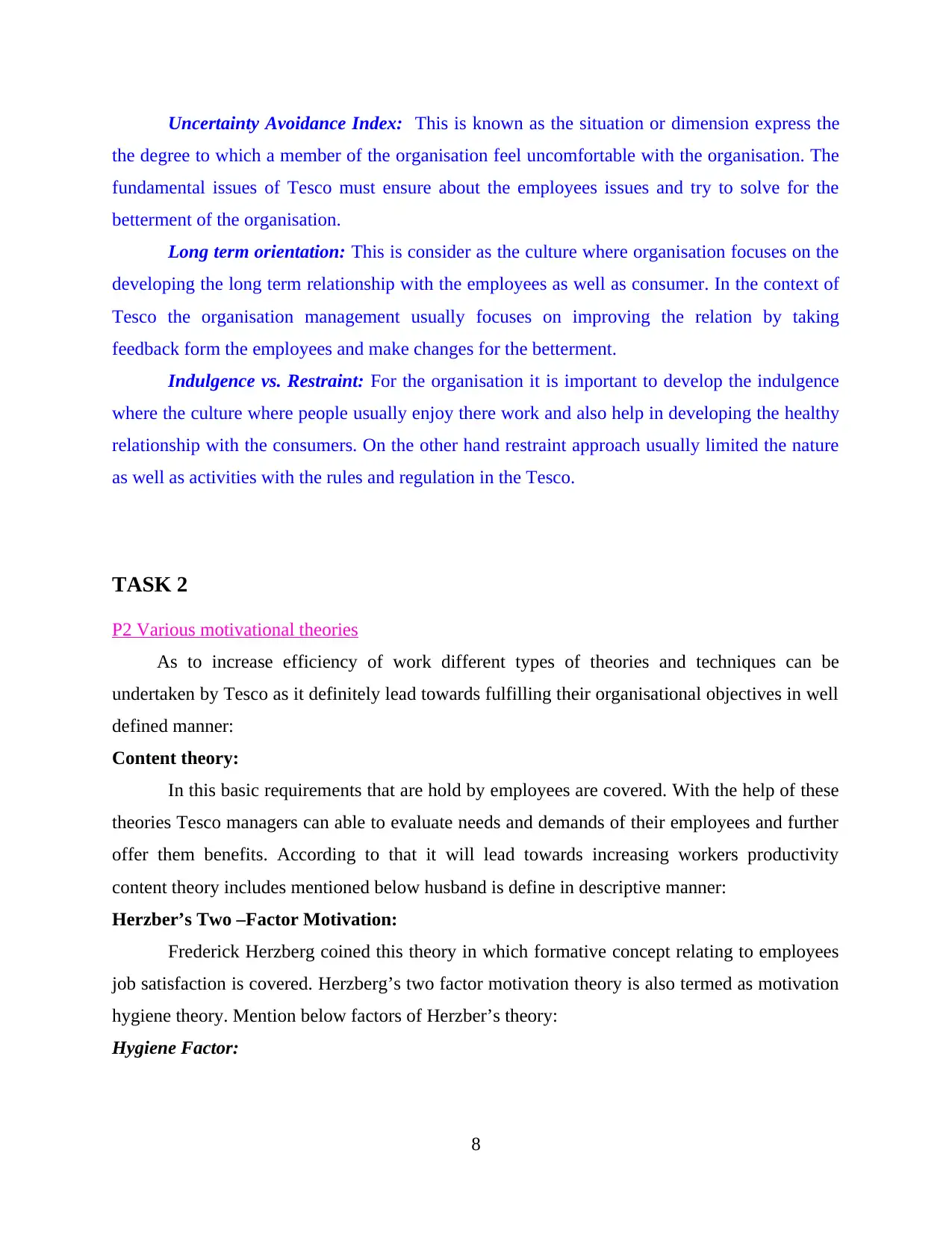
Uncertainty Avoidance Index: This is known as the situation or dimension express the
the degree to which a member of the organisation feel uncomfortable with the organisation. The
fundamental issues of Tesco must ensure about the employees issues and try to solve for the
betterment of the organisation.
Long term orientation: This is consider as the culture where organisation focuses on the
developing the long term relationship with the employees as well as consumer. In the context of
Tesco the organisation management usually focuses on improving the relation by taking
feedback form the employees and make changes for the betterment.
Indulgence vs. Restraint: For the organisation it is important to develop the indulgence
where the culture where people usually enjoy there work and also help in developing the healthy
relationship with the consumers. On the other hand restraint approach usually limited the nature
as well as activities with the rules and regulation in the Tesco.
TASK 2
P2 Various motivational theories
As to increase efficiency of work different types of theories and techniques can be
undertaken by Tesco as it definitely lead towards fulfilling their organisational objectives in well
defined manner:
Content theory:
In this basic requirements that are hold by employees are covered. With the help of these
theories Tesco managers can able to evaluate needs and demands of their employees and further
offer them benefits. According to that it will lead towards increasing workers productivity
content theory includes mentioned below husband is define in descriptive manner:
Herzber’s Two –Factor Motivation:
Frederick Herzberg coined this theory in which formative concept relating to employees
job satisfaction is covered. Herzberg’s two factor motivation theory is also termed as motivation
hygiene theory. Mention below factors of Herzber’s theory:
Hygiene Factor:
8
the degree to which a member of the organisation feel uncomfortable with the organisation. The
fundamental issues of Tesco must ensure about the employees issues and try to solve for the
betterment of the organisation.
Long term orientation: This is consider as the culture where organisation focuses on the
developing the long term relationship with the employees as well as consumer. In the context of
Tesco the organisation management usually focuses on improving the relation by taking
feedback form the employees and make changes for the betterment.
Indulgence vs. Restraint: For the organisation it is important to develop the indulgence
where the culture where people usually enjoy there work and also help in developing the healthy
relationship with the consumers. On the other hand restraint approach usually limited the nature
as well as activities with the rules and regulation in the Tesco.
TASK 2
P2 Various motivational theories
As to increase efficiency of work different types of theories and techniques can be
undertaken by Tesco as it definitely lead towards fulfilling their organisational objectives in well
defined manner:
Content theory:
In this basic requirements that are hold by employees are covered. With the help of these
theories Tesco managers can able to evaluate needs and demands of their employees and further
offer them benefits. According to that it will lead towards increasing workers productivity
content theory includes mentioned below husband is define in descriptive manner:
Herzber’s Two –Factor Motivation:
Frederick Herzberg coined this theory in which formative concept relating to employees
job satisfaction is covered. Herzberg’s two factor motivation theory is also termed as motivation
hygiene theory. Mention below factors of Herzber’s theory:
Hygiene Factor:
8
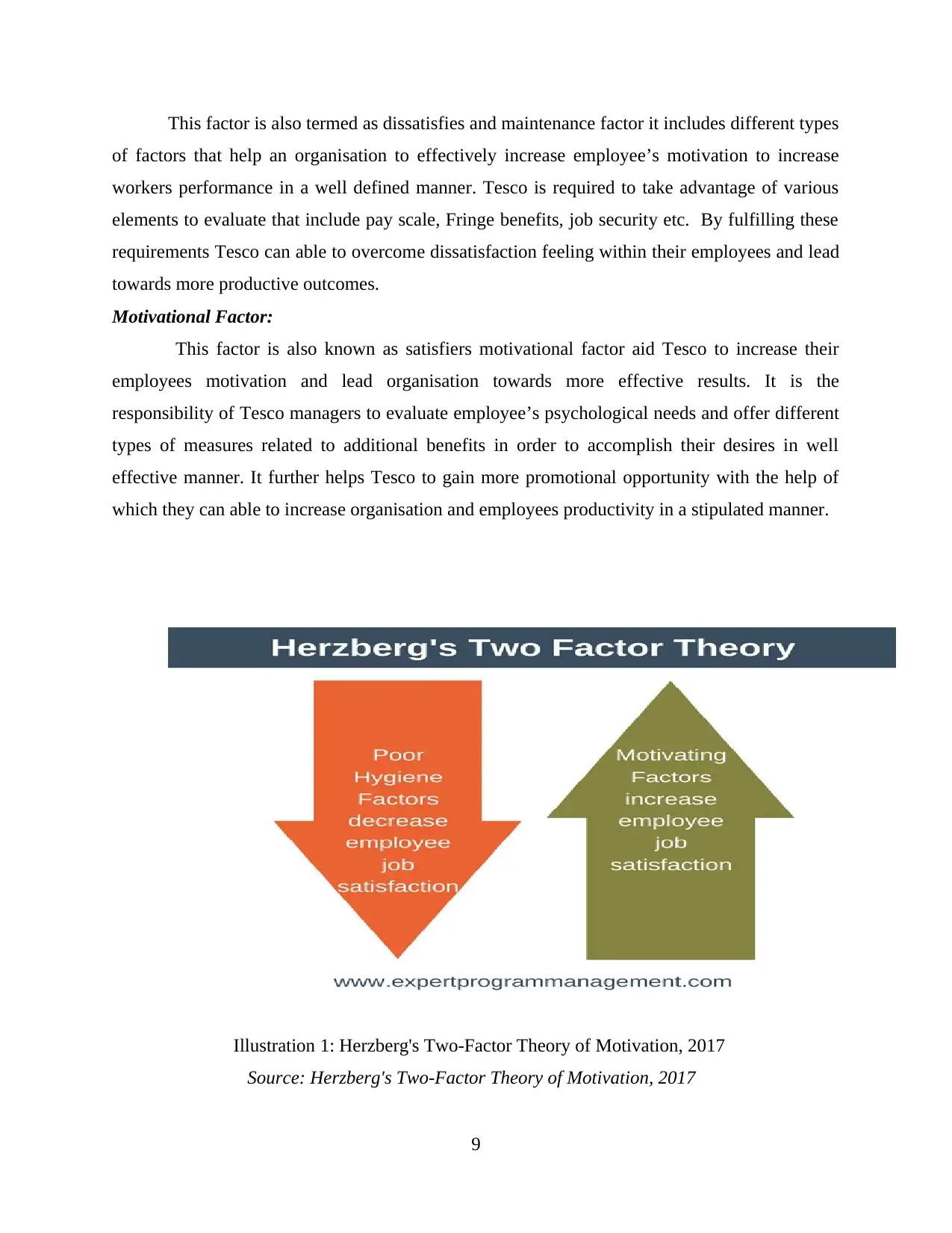
This factor is also termed as dissatisfies and maintenance factor it includes different types
of factors that help an organisation to effectively increase employee’s motivation to increase
workers performance in a well defined manner. Tesco is required to take advantage of various
elements to evaluate that include pay scale, Fringe benefits, job security etc. By fulfilling these
requirements Tesco can able to overcome dissatisfaction feeling within their employees and lead
towards more productive outcomes.
Motivational Factor:
This factor is also known as satisfiers motivational factor aid Tesco to increase their
employees motivation and lead organisation towards more effective results. It is the
responsibility of Tesco managers to evaluate employee’s psychological needs and offer different
types of measures related to additional benefits in order to accomplish their desires in well
effective manner. It further helps Tesco to gain more promotional opportunity with the help of
which they can able to increase organisation and employees productivity in a stipulated manner.
Illustration 1: Herzberg's Two-Factor Theory of Motivation, 2017
Source: Herzberg's Two-Factor Theory of Motivation, 2017
9
of factors that help an organisation to effectively increase employee’s motivation to increase
workers performance in a well defined manner. Tesco is required to take advantage of various
elements to evaluate that include pay scale, Fringe benefits, job security etc. By fulfilling these
requirements Tesco can able to overcome dissatisfaction feeling within their employees and lead
towards more productive outcomes.
Motivational Factor:
This factor is also known as satisfiers motivational factor aid Tesco to increase their
employees motivation and lead organisation towards more effective results. It is the
responsibility of Tesco managers to evaluate employee’s psychological needs and offer different
types of measures related to additional benefits in order to accomplish their desires in well
effective manner. It further helps Tesco to gain more promotional opportunity with the help of
which they can able to increase organisation and employees productivity in a stipulated manner.
Illustration 1: Herzberg's Two-Factor Theory of Motivation, 2017
Source: Herzberg's Two-Factor Theory of Motivation, 2017
9
⊘ This is a preview!⊘
Do you want full access?
Subscribe today to unlock all pages.

Trusted by 1+ million students worldwide
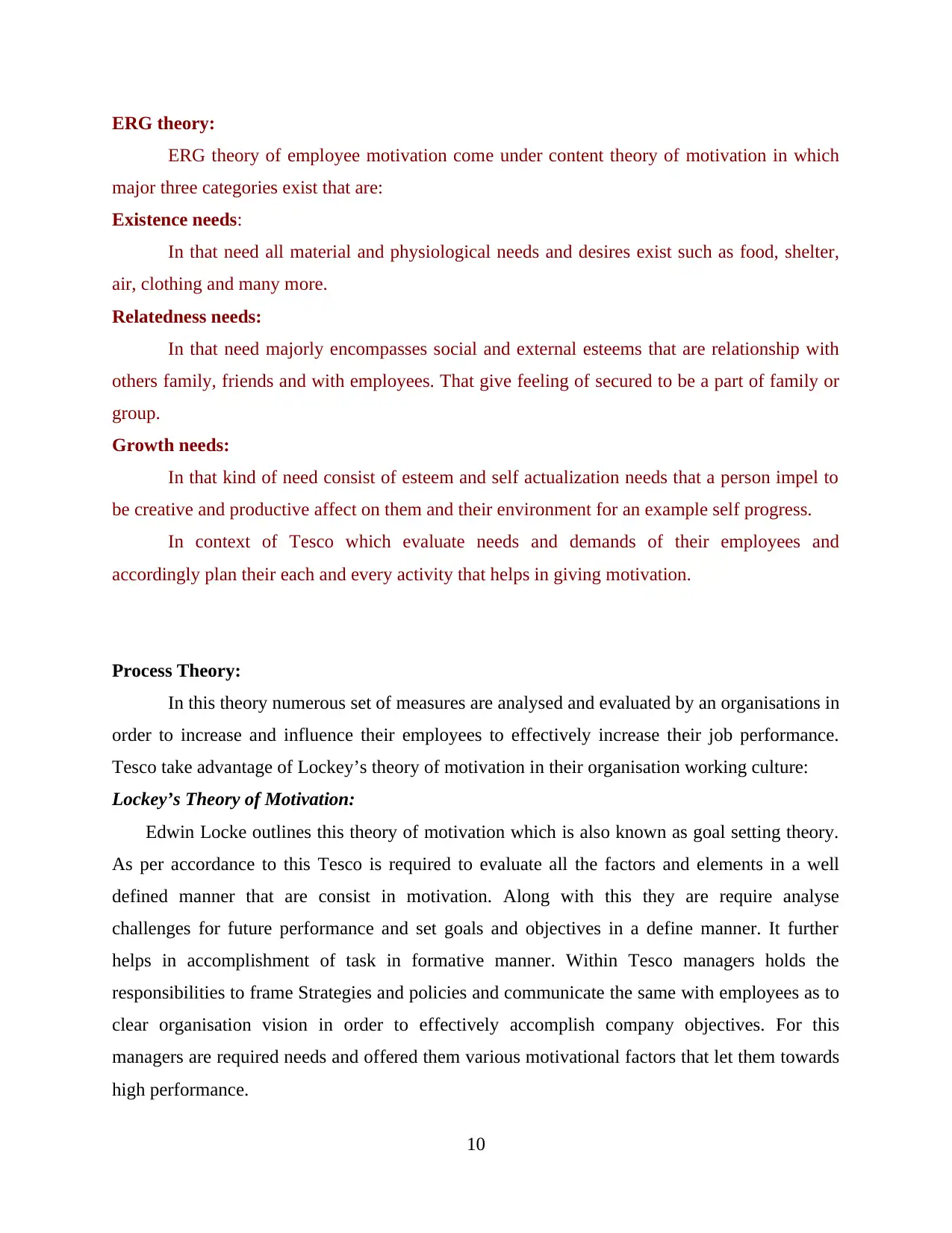
ERG theory:
ERG theory of employee motivation come under content theory of motivation in which
major three categories exist that are:
Existence needs:
In that need all material and physiological needs and desires exist such as food, shelter,
air, clothing and many more.
Relatedness needs:
In that need majorly encompasses social and external esteems that are relationship with
others family, friends and with employees. That give feeling of secured to be a part of family or
group.
Growth needs:
In that kind of need consist of esteem and self actualization needs that a person impel to
be creative and productive affect on them and their environment for an example self progress.
In context of Tesco which evaluate needs and demands of their employees and
accordingly plan their each and every activity that helps in giving motivation.
Process Theory:
In this theory numerous set of measures are analysed and evaluated by an organisations in
order to increase and influence their employees to effectively increase their job performance.
Tesco take advantage of Lockey’s theory of motivation in their organisation working culture:
Lockey’s Theory of Motivation:
Edwin Locke outlines this theory of motivation which is also known as goal setting theory.
As per accordance to this Tesco is required to evaluate all the factors and elements in a well
defined manner that are consist in motivation. Along with this they are require analyse
challenges for future performance and set goals and objectives in a define manner. It further
helps in accomplishment of task in formative manner. Within Tesco managers holds the
responsibilities to frame Strategies and policies and communicate the same with employees as to
clear organisation vision in order to effectively accomplish company objectives. For this
managers are required needs and offered them various motivational factors that let them towards
high performance.
10
ERG theory of employee motivation come under content theory of motivation in which
major three categories exist that are:
Existence needs:
In that need all material and physiological needs and desires exist such as food, shelter,
air, clothing and many more.
Relatedness needs:
In that need majorly encompasses social and external esteems that are relationship with
others family, friends and with employees. That give feeling of secured to be a part of family or
group.
Growth needs:
In that kind of need consist of esteem and self actualization needs that a person impel to
be creative and productive affect on them and their environment for an example self progress.
In context of Tesco which evaluate needs and demands of their employees and
accordingly plan their each and every activity that helps in giving motivation.
Process Theory:
In this theory numerous set of measures are analysed and evaluated by an organisations in
order to increase and influence their employees to effectively increase their job performance.
Tesco take advantage of Lockey’s theory of motivation in their organisation working culture:
Lockey’s Theory of Motivation:
Edwin Locke outlines this theory of motivation which is also known as goal setting theory.
As per accordance to this Tesco is required to evaluate all the factors and elements in a well
defined manner that are consist in motivation. Along with this they are require analyse
challenges for future performance and set goals and objectives in a define manner. It further
helps in accomplishment of task in formative manner. Within Tesco managers holds the
responsibilities to frame Strategies and policies and communicate the same with employees as to
clear organisation vision in order to effectively accomplish company objectives. For this
managers are required needs and offered them various motivational factors that let them towards
high performance.
10
Paraphrase This Document
Need a fresh take? Get an instant paraphrase of this document with our AI Paraphraser
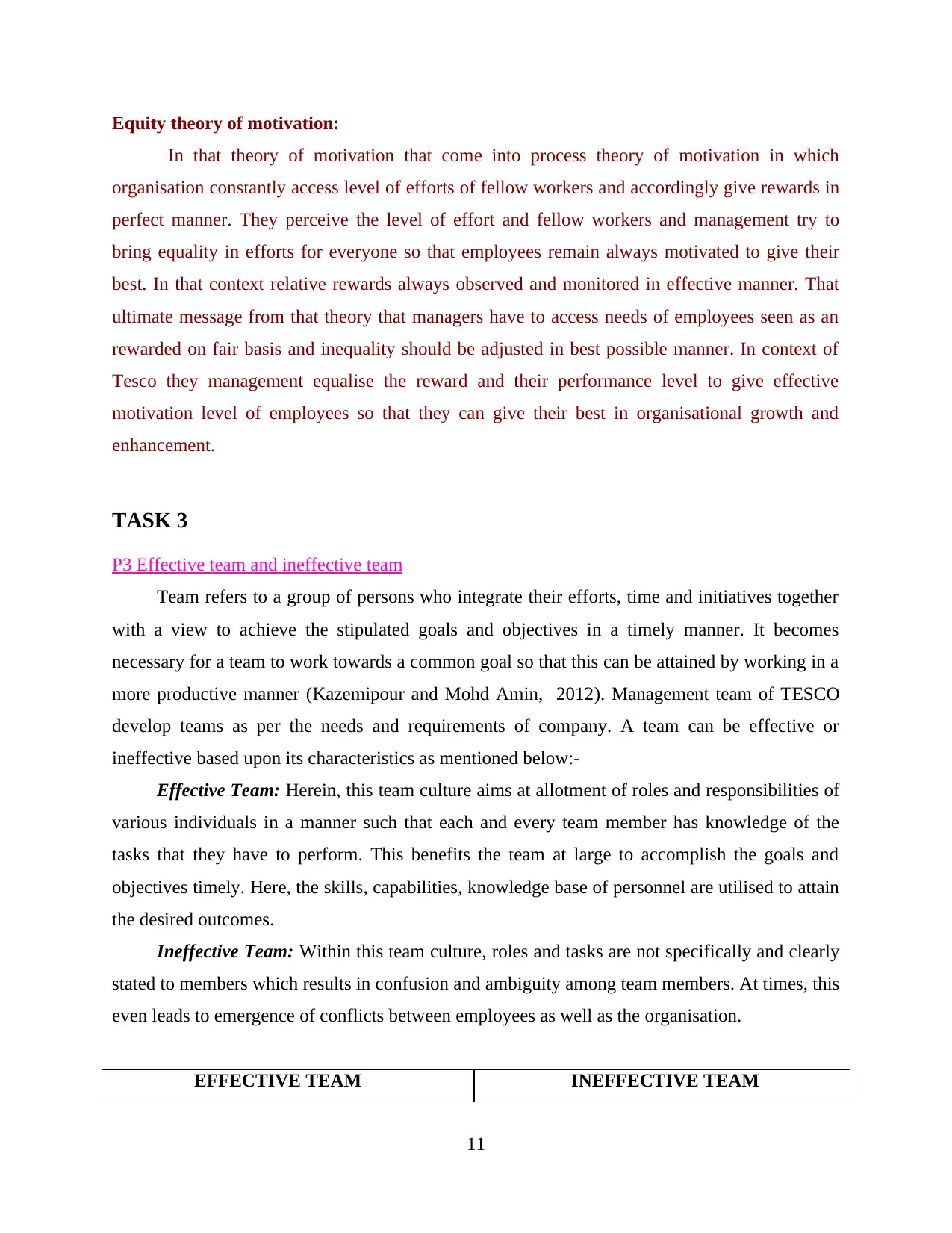
Equity theory of motivation:
In that theory of motivation that come into process theory of motivation in which
organisation constantly access level of efforts of fellow workers and accordingly give rewards in
perfect manner. They perceive the level of effort and fellow workers and management try to
bring equality in efforts for everyone so that employees remain always motivated to give their
best. In that context relative rewards always observed and monitored in effective manner. That
ultimate message from that theory that managers have to access needs of employees seen as an
rewarded on fair basis and inequality should be adjusted in best possible manner. In context of
Tesco they management equalise the reward and their performance level to give effective
motivation level of employees so that they can give their best in organisational growth and
enhancement.
TASK 3
P3 Effective team and ineffective team
Team refers to a group of persons who integrate their efforts, time and initiatives together
with a view to achieve the stipulated goals and objectives in a timely manner. It becomes
necessary for a team to work towards a common goal so that this can be attained by working in a
more productive manner (Kazemipour and Mohd Amin, 2012). Management team of TESCO
develop teams as per the needs and requirements of company. A team can be effective or
ineffective based upon its characteristics as mentioned below:-
Effective Team: Herein, this team culture aims at allotment of roles and responsibilities of
various individuals in a manner such that each and every team member has knowledge of the
tasks that they have to perform. This benefits the team at large to accomplish the goals and
objectives timely. Here, the skills, capabilities, knowledge base of personnel are utilised to attain
the desired outcomes.
Ineffective Team: Within this team culture, roles and tasks are not specifically and clearly
stated to members which results in confusion and ambiguity among team members. At times, this
even leads to emergence of conflicts between employees as well as the organisation.
EFFECTIVE TEAM INEFFECTIVE TEAM
11
In that theory of motivation that come into process theory of motivation in which
organisation constantly access level of efforts of fellow workers and accordingly give rewards in
perfect manner. They perceive the level of effort and fellow workers and management try to
bring equality in efforts for everyone so that employees remain always motivated to give their
best. In that context relative rewards always observed and monitored in effective manner. That
ultimate message from that theory that managers have to access needs of employees seen as an
rewarded on fair basis and inequality should be adjusted in best possible manner. In context of
Tesco they management equalise the reward and their performance level to give effective
motivation level of employees so that they can give their best in organisational growth and
enhancement.
TASK 3
P3 Effective team and ineffective team
Team refers to a group of persons who integrate their efforts, time and initiatives together
with a view to achieve the stipulated goals and objectives in a timely manner. It becomes
necessary for a team to work towards a common goal so that this can be attained by working in a
more productive manner (Kazemipour and Mohd Amin, 2012). Management team of TESCO
develop teams as per the needs and requirements of company. A team can be effective or
ineffective based upon its characteristics as mentioned below:-
Effective Team: Herein, this team culture aims at allotment of roles and responsibilities of
various individuals in a manner such that each and every team member has knowledge of the
tasks that they have to perform. This benefits the team at large to accomplish the goals and
objectives timely. Here, the skills, capabilities, knowledge base of personnel are utilised to attain
the desired outcomes.
Ineffective Team: Within this team culture, roles and tasks are not specifically and clearly
stated to members which results in confusion and ambiguity among team members. At times, this
even leads to emergence of conflicts between employees as well as the organisation.
EFFECTIVE TEAM INEFFECTIVE TEAM
11
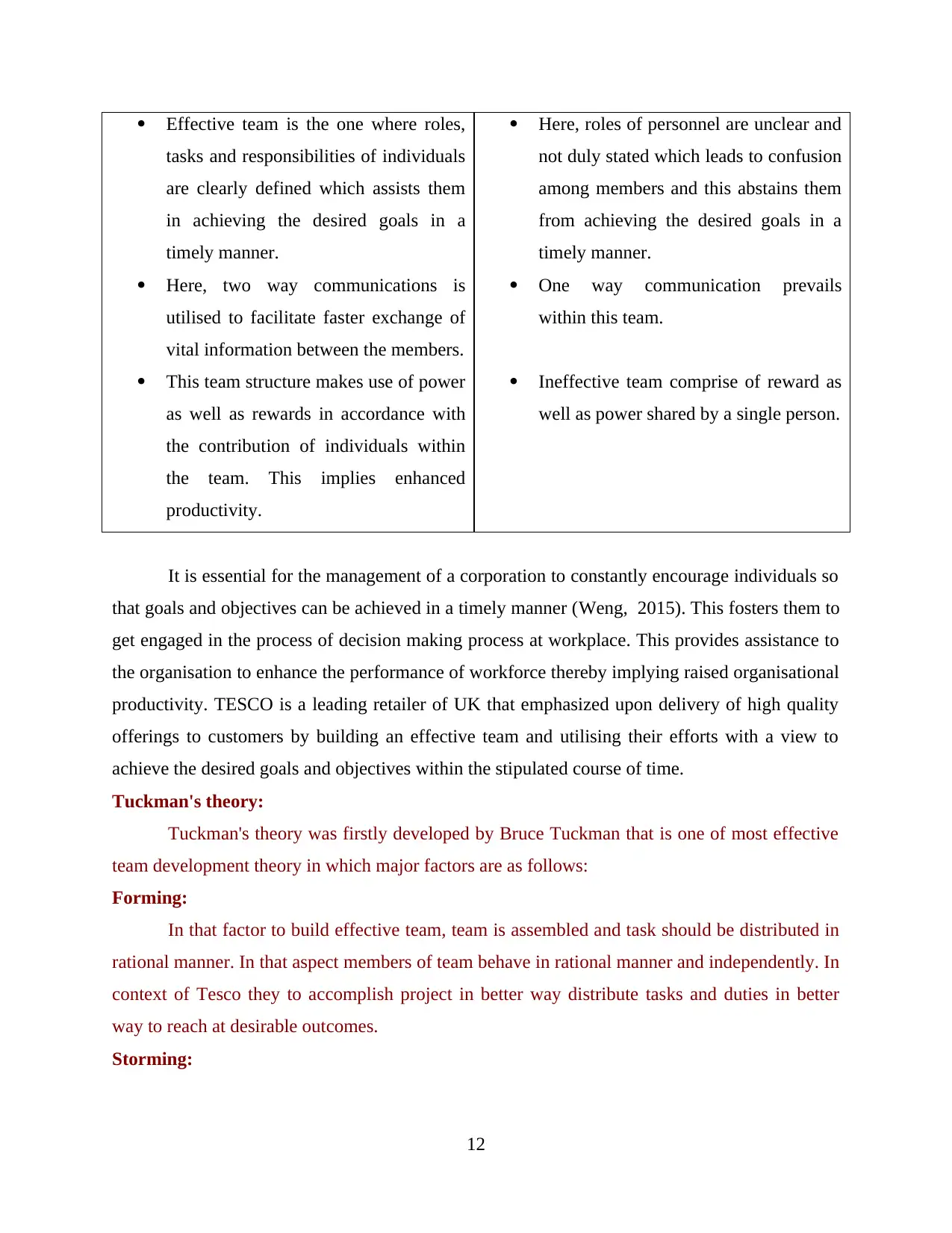
Effective team is the one where roles,
tasks and responsibilities of individuals
are clearly defined which assists them
in achieving the desired goals in a
timely manner.
Here, two way communications is
utilised to facilitate faster exchange of
vital information between the members.
This team structure makes use of power
as well as rewards in accordance with
the contribution of individuals within
the team. This implies enhanced
productivity.
Here, roles of personnel are unclear and
not duly stated which leads to confusion
among members and this abstains them
from achieving the desired goals in a
timely manner.
One way communication prevails
within this team.
Ineffective team comprise of reward as
well as power shared by a single person.
It is essential for the management of a corporation to constantly encourage individuals so
that goals and objectives can be achieved in a timely manner (Weng, 2015). This fosters them to
get engaged in the process of decision making process at workplace. This provides assistance to
the organisation to enhance the performance of workforce thereby implying raised organisational
productivity. TESCO is a leading retailer of UK that emphasized upon delivery of high quality
offerings to customers by building an effective team and utilising their efforts with a view to
achieve the desired goals and objectives within the stipulated course of time.
Tuckman's theory:
Tuckman's theory was firstly developed by Bruce Tuckman that is one of most effective
team development theory in which major factors are as follows:
Forming:
In that factor to build effective team, team is assembled and task should be distributed in
rational manner. In that aspect members of team behave in rational manner and independently. In
context of Tesco they to accomplish project in better way distribute tasks and duties in better
way to reach at desirable outcomes.
Storming:
12
tasks and responsibilities of individuals
are clearly defined which assists them
in achieving the desired goals in a
timely manner.
Here, two way communications is
utilised to facilitate faster exchange of
vital information between the members.
This team structure makes use of power
as well as rewards in accordance with
the contribution of individuals within
the team. This implies enhanced
productivity.
Here, roles of personnel are unclear and
not duly stated which leads to confusion
among members and this abstains them
from achieving the desired goals in a
timely manner.
One way communication prevails
within this team.
Ineffective team comprise of reward as
well as power shared by a single person.
It is essential for the management of a corporation to constantly encourage individuals so
that goals and objectives can be achieved in a timely manner (Weng, 2015). This fosters them to
get engaged in the process of decision making process at workplace. This provides assistance to
the organisation to enhance the performance of workforce thereby implying raised organisational
productivity. TESCO is a leading retailer of UK that emphasized upon delivery of high quality
offerings to customers by building an effective team and utilising their efforts with a view to
achieve the desired goals and objectives within the stipulated course of time.
Tuckman's theory:
Tuckman's theory was firstly developed by Bruce Tuckman that is one of most effective
team development theory in which major factors are as follows:
Forming:
In that factor to build effective team, team is assembled and task should be distributed in
rational manner. In that aspect members of team behave in rational manner and independently. In
context of Tesco they to accomplish project in better way distribute tasks and duties in better
way to reach at desirable outcomes.
Storming:
12
⊘ This is a preview!⊘
Do you want full access?
Subscribe today to unlock all pages.

Trusted by 1+ million students worldwide
1 out of 19
Related Documents
Your All-in-One AI-Powered Toolkit for Academic Success.
+13062052269
info@desklib.com
Available 24*7 on WhatsApp / Email
![[object Object]](/_next/static/media/star-bottom.7253800d.svg)
Unlock your academic potential
Copyright © 2020–2026 A2Z Services. All Rights Reserved. Developed and managed by ZUCOL.





